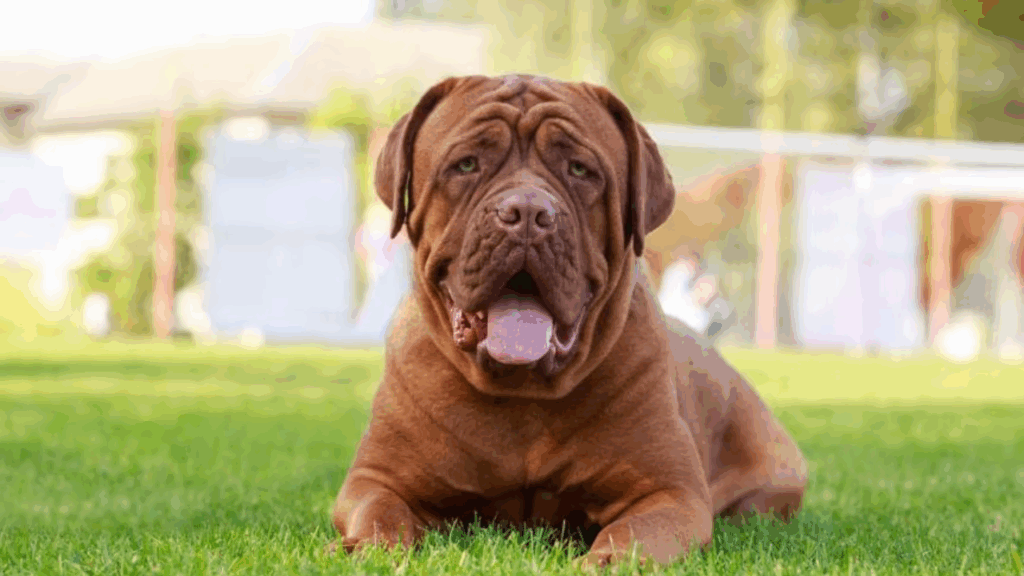The Dogue de Bordeaux, often referred to as the French Mastiff, is a breed known for its powerful build, soulful expression, and unwavering loyalty. With a history rooted deep in French culture, this breed has captured the hearts of dog enthusiasts around the world. Despite its intimidating appearance, the Dogue de Bordeaux is a gentle, affectionate, and courageous companion, making it a unique and endearing addition to any household.
A Rich History
The Dogue de Bordeaux is one of the oldest French dog breeds, dating back to at least the 14th century. Its exact origins are somewhat debated, but many experts believe that the breed descends from ancient mastiff-type dogs brought to Europe by the Romans. Over the centuries, the Dogue de Bordeaux was employed in a variety of roles, including guarding estates, pulling carts, and even hunting large game like boars.
The breed was particularly popular among French nobility but also found favor among commoners, especially as a formidable guard dog. During the French Revolution, the Dogue de Bordeaux’s association with the aristocracy led to a decline in its numbers, but it survived and continued to evolve into the breed we know today.
Appearance and Physical Traits
One glance at the Dogue de Bordeaux and it’s clear that this breed exudes strength and authority. Males typically weigh between 110 and 150 pounds, while females are slightly lighter. Their muscular frame is complemented by loose skin, a broad chest, and a distinctive, wrinkled face with a serious, almost pensive expression.
The breed’s short, fine coat is most commonly a shade of fawn, ranging from light to dark tones. Some dogs may have small white patches on their chest and paws. The Dogue de Bordeaux also features a thick, powerful neck and a prominent, expressive head that is among the largest in the canine world, relative to body size.
Temperament and Personality
Despite its formidable appearance, the Dogue de Bordeaux is known for being a gentle giant. They are deeply affectionate with their families and often form strong, almost inseparable bonds with their owners. Their loyalty is unmatched, and they are naturally protective, making them excellent watchdogs.
However, this breed is not aggressive without cause. A well-socialized Dogue de Bordeaux is calm, patient, and loving. They are particularly good with children, often showing remarkable patience and tolerance. Nonetheless, because of their sheer size and strength, early socialization and consistent training are crucial to ensure they grow into well-mannered adults.
These dogs are also known for being somewhat stubborn, which can make training a challenge for inexperienced owners. Positive reinforcement techniques, patience, and a firm, confident approach are key when working with this breed.
Care and Health
Caring for a Dogue de Bordeaux requires a commitment to both their physical and emotional needs. They are not high-energy dogs, but they do require daily exercise to maintain their health and prevent obesity. Regular walks, moderate playtime, and mental stimulation are essential.
The breed’s short coat is relatively low maintenance, needing only weekly brushing to remove loose hair and keep their skin healthy. However, their facial wrinkles should be cleaned regularly to prevent irritation or infection.
Health-wise, the Dogue de Bordeaux is prone to several conditions typical of large breeds, including hip and elbow dysplasia, heart issues (especially dilated cardiomyopathy), and certain types of cancers. They also have a relatively short lifespan, averaging around 5 to 8 years. Regular veterinary check-ups, a nutritious diet, and maintaining a healthy weight can help maximize their quality of life.
Ideal Home Environment
The Dogue de Bordeaux thrives in a home where it can be close to its family. They do not do well when left alone for long periods and can develop separation anxiety. Due to their size and protective nature, they are better suited for homes with secure, fenced yards rather than small apartments.
They also need owners who understand the importance of early socialization and positive training methods. First-time dog owners may find this breed challenging, but experienced dog lovers who can offer firm leadership, affection, and consistency will find the Dogue de Bordeaux a deeply rewarding companion.
Conclusion
The Dogue de Bordeaux is a majestic blend of power, loyalty, and affection. While they may appear intimidating at first glance, those who take the time to understand and properly care for this breed will find a gentle, devoted, and incredibly loving friend. Their rich history, noble demeanor, and steadfast companionship make the Dogue de Bordeaux not just a pet, but a cherished member of the family.
For those willing to meet the Dogue de Bordeaux’s needs with patience and dedication, few breeds offer such profound loyalty and warmth.

Andy Parker is a dog lover, writer, and senior editor at BarkPicks. With years of experience covering canine health, training, and gear, he helps pet parents make smarter choices for happier, healthier dogs. Andy shares his home (and heart) with two rescue pups, Charlie and Mia.



